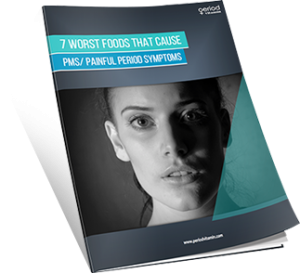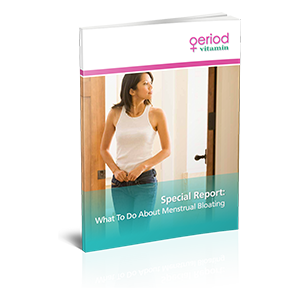If you know in your heart that natural is always the best way to go for your health, you may be wondering what are the best vitamins for menstrual bloating.
What dosage should you take? Are you already taking these vitamins and minerals? You’re determined to stop feeling bloated during your period and ready to start right now.
Well, there are several vitamins you should be taking if you are bloated during your period.
 Here’s a short list of what you need to get started:
Here’s a short list of what you need to get started:
1. Vitamin B6
Vitamin B6 is essential to prevent water retention, a major cause of bloating. A deficiency also causes cracks around the mouth and eyes, cramps in your arms and legs, blood sugar disturbances, and slow learning. Anemia is also a symptom, as is depression, nervousness and irritabilitiy.
Dosage is 100 mg daily and some studies have used even 500 mg per day for short periods of a time when necessary.
Whenever you’re taking one B vitamin in higher doses than the others, it’s important to also take a B complex with all the other B vitamins in it. The dosage of the other B vitamins should be 25 mg to 50 mg. This can help prevent new deficiencies from occurring plus the other vitamins are also needed to relieve the bloating.
2. Vitamin C
Vitamin C is nature’s diuretic. It’s also especially important for the adrenal glands and if your periods tend to be just as stressful as getting fired, moving, or a death in the family, this vitamin will be one of your best friends. It can reduce the bloating. Always include vitamin C in your vitamins for PMS bloating.
Dosage depends on a lot of different factors. For example, if your family has been here in the U.S. for several generations, you most likely can take a lot more vitamin C daily than someone who is a first or second generation resident in the U.S. Start with a dosage of 500 mg and then move up from there. But do remember that vitamin C isn’t a vitamin to play around with; you must take it daily once you commit. Stopping suddenly causes symptoms of scurvy to rapidly appear (bruising, spontaneous bleeding). So be consistent.
3. Vitamin D
Vitamin D isn’t specifically one of the best vitamins for period bloating but when it’s in deficiency status, all hell breaks out in the body. The genes of over 300 different diseases are turned on, and you can bet that at least 50 of these diseases have bloating as one of their symptoms. It’s just not worth it to risk having a deficiency.
You should get a vitamin D test to see what your vitamin D status is right now, and then repeat it in three months. If your level is less than 65 mg/dl on the test, consider that you need a supplement. Doctors are leery of recommending a supplement if you’re between 30 and 65; however, this is a display of lack of nutrition knowledge. You want optimal functioning not marginal functioning.
Dosages to take depend on your status. Taking 1000 IU vitamin D3 per day is never enough to overcome a deficiency; only levels of 10,000 IU per day for three months will do that.
4. Vitamin B Complex
Many of the B vitamins are related to intestinal disorders and PMS. For example, vitamin B1 deficiency causes indigestion and severe constipation, which can be tied in with the reasons for the PMS bloating in the first place. Vitamin B3 deficiency causes headaches, nausea, vomiting, diarrhea, bloating, bad breath, small ulcers and inflammation of the GI tract. Pantothenic acid (vitamin B5) deficiency is important for the breakdown and utilization of protein, fats, and carbohydrates. Without proper breakdown you’ll have bloating.
A B complex should be a no-brainer in your pill box of vitamins for PMS bloating. If you’ve never taken a B complex, start with a 25 mg or 50 mg B complex tablet, which offers 25 or 50 mg of vitamin B1, B2, and B6, and double this amount for vitamin B3 (niacin).
Experiment with the vitamins to determine what are your best vitamins for period bloating. You could take a specific “Period Vitamin” which will give you the basics and then see if you need any other vitamins to help with pms bloating after that



